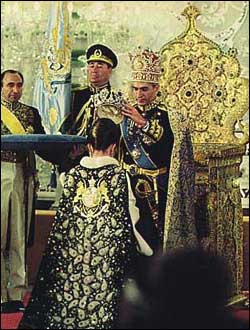Tuesday August 30, 2011
History of Iran
Mohammad Reza Shah Pahlavi
Arya Mehr and Shahanshah (King of the Kings)
 |
| Mohammad Reza Shah & Empress Farah |
He replaced his father, Reza Shah, on the throne on September 16, 1941, shortly before his 22nd birthday. He continued the reform policies of his father, but a contest for control of the government soon erupted between the shah and an older professional politician, the nationalistic Mohammad Mosaddeq.
During World War II, Britain and the USSR were concerned by Reza Shah's friendly relations with Germany. In 1941 the two countries invaded and occupied large areas of Iran. They forced Reza Shah to abdicate, and in the absence of a viable alternative, permitted Mohammad Reza to assume the throne. The new shah's reign began against a backdrop of social and political disarray, economic problems, and food shortages.
Despite his vow to act as a constitutional monarch who would defer to the power of the parliamentary government, Mohammad Reza increasingly involved himself in governmental affairs and opposed or thwarted strong prime ministers. Prone to indecision, however, Mohammad Reza relied more on manipulation than on leadership. He concentrated on reviving the army and ensuring that it would remain under royal control as the monarchy's main power base. In 1949 an assassination attempt on the Shah, attributed to the pro-Soviet Tudeh Party, resulted in the banning of that party and the expansion of the Shah's constitutional powers.
In the context of regional turmoil and the Cold War, the Shah established himself as an indispensable ally of the West. Domestically, he advocated reform policies, culminating in the 1963 program known as the White Revolution, which included land reform, the extension of voting rights to women, and the elimination of illiteracy.
In 1967 he crowned himself as King of the Kings (Emperor of Iran) and his wife, Farah Diba, as Shahbanoo (Empress), which caused discontentment amongst diffrent levels of society.
 |
| Coronation of Mohammad Reza Shah |
The shah's regime suppressed and marginalized its opponents with the help of Iran's security and intelligence organization, the SAVAK. Relying on oil revenues, which sharply increased in late 1973, the Shah pursued his goal of developing Iran as a mighty regional power dedicated to social reform and economic development. Yet he continually sidestepped democratic arrangements and refused to allow meaningful civic and political liberties, remaining unresponsive to public opinion.
By the mid-1970s the Shah reigned amidst widespread discontent caused by the continuing repressiveness of his regime, socioeconomic changes that benefited some classes at the expense of others, and the increasing gap between the ruling elite and the disaffected populace. Islamic leaders, particularly the exiled cleric Ayatollah Khomeini, were able to focus this discontent with a populist ideology tied to Islamic principles and calls for the overthrow of the shah. The Shah's government collapsed following widespread uprisings in 1978 -1979 and consequently an Islamic Republic succeeded his regime.
Beset by advanced cancer, the shah left Iran in January 1979 to begin a life in exile. He lived in Egypt, Morocco, the Bahamas, and Mexico before going to the United States for treatment of lymphatic cancer. His arrival in New York City led to the Iranian takeover of the American Embassy in Tehran by "Students of Imam's Line" and the taking hostage of more than 50 Americans for 444 days.
The Shah died in Cairo, Egypt, on July 27, 1980.

from: http://www.iranchamber.com/history/mohammad_rezashah/mohammad_rezashah.php








